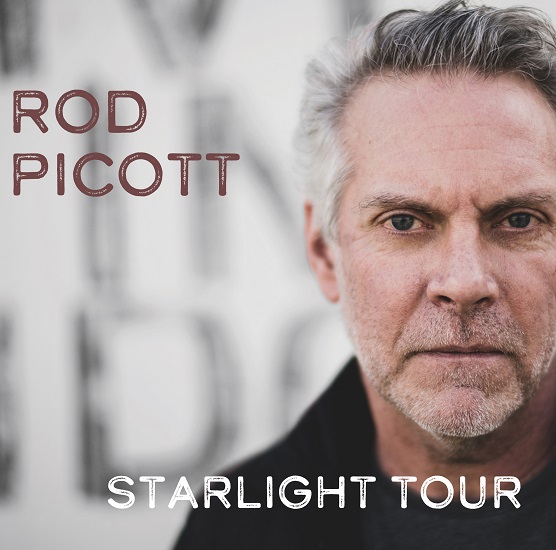
Rod Picott’s a craftsman, working on songs in the same way as carpenter works with wood and a mason works with stone. When he talks about the songs in his notes on the album, he uses images of chisels and carving knives to illustrate the process of knocking a song into shape. If there’s a better songwriting chronicler of rust-belt blue-collar America than Rod Picott, I haven’t heard them; he’s totally authentic and he incorporates his own experiences into his work. By his own admission he’s finding it more difficult to create songs these days after ten albums but he’s now working with other songwriters to create classic songs; the magic is still most definitely there and ‘Starlight Tour’ is probably the most complete Rod Picott album I’ve heard.
The discipline required to complete the album in just five studio days with producer Neilson Hubbard is evident in the arrangement for all ten songs, whether it’s the full-band sound of the blue-collar anthem ‘Digging Ditches’ and moody nostalgic rock of ‘Wasteland’ or the two stripped-back songs that close the album, ‘Pelican Bay’ telling the story of Vietnam veteran and his happiness followed by tragedy and the intimations of mortality in the closing song ‘It’s Time to Let Go of Your Dreams’ with a close-mic vocal backed by acoustic guitar and a very understated muted trumpet solo.
There are references you come to expect on a Rod Picott album; boxing’s one of them. His take on the tragic life of Sonny Liston from 2022’s ‘Paper Hearts and Broken Arrows’ is a classic. Here he builds ‘A Puncher’s Chance’ around a boxing metaphor which he applies to a romantic pursuit; the last thing to go is a boxer’s strength, so there’s always a chance of landing a lucky punch if you’re willing to take enough punishment along the way.
Rod’s songs are firmly grounded in real life; his style is very much audio verité and two of the co-writes demonstrate this in different ways. ‘Homecoming Queen’, written with Amy Speace, tells a familiar story with a more personal twist, while the Nick Nace co-write is an exploration of tales of the Saskatoon Police dumping drunk indigenous people outside the city in winter to die of hypothermia. There’s a terrible economy and clarity in the line “His crime was being, drunk, brown and poor” set against the sparse arrangement of ‘Starlight Tour’ that stops you in your tracks.
If you’ve heard any of Rod’s previous work, you’ll recognise some of the themes here; his interest in boxing, looking through the rear-view at small-town America and his love of its inhabitants. The change in tone with ‘Starlight Tour’ and, to a certain extent, its predecessor ‘Paper Hearts and Broken Arrows’ is that they‘re looking forwards at a road that’s much shorter than the road already travelled. It’s a difficult realisation to come to terms with and it adds a maturity to the album that promotes it from great Rod Picott album to classic singer-songwriter album.
‘Starlight Tour’ is released in the UK on Friday October 20th on Welding Rod Records.
Here’s the lyric video from the album’s opening song, ‘Next Man in Line’:

Every so often, an album comes along that isn’t just a great collection of songs played beautifully; an album that pushes a few personal buttons and maybe touches a few raw nerves as well. Rod Picott’s ‘Paper Hearts and Broken Arrows’ is one of those albums that creates a very personal connection. Maybe it’s an East Coast thing between Maine in the USA and Fife in Scotland; you don’t need to look too hard to see the parallels and ‘Washington County’ paints a picture of an area where genteel resorts sit side by side with poverty-stricken former industrial towns and villages. They’re three thousand miles apart, but it’s the same experience.
Just taking a step to one side for a moment, as music has moved into the digital realm, so have some of the ways of getting it out there and letting people know about it. It’s not so long since review copies arrived as CDs (or vinyl if you want go back a bit further) with an A4 press release, through the letterbox. Now they arrive in your inbox and an artist or PR team can include much more material with no extra distribution costs. Which means that artwork and credits, additional photos and lyric sheets are fairly common now and there’s a relatively recent addition of the artist’s ‘track-by-track’ notes. Reviewers should rely more on their ears and instincts than press releases, but you can sometimes pick up a useful insight into the artist’s vision. In the case of Rod Picott, there’s always something worth reading when he puts fingers to keyboard.
The story behind ‘Valentine’s Day’ on this album is a perfect example. It’s a very honest song, painfully so, that’s stripped back to the raw basics of acoustic guitar and cracked vocal. Rod’s notes tell us that the original recording was a full band version that sounded “wonderful – and completely wrong”, like “an Eagles track with a guy that can’t really sing”; the arrangement was too perfect and in Rod’s words again, “for me, perfect is almost always wrong”. Producer Neilson Hubbard liked the stripped-back version and three takes later it was in the can.
There are a couple of strands that run through the album, Rod’s acceptance of a spell of single life that surfaces in the opening song ‘Lover’, ‘Valentine’s Day’ and ‘Mona Lisa’ where the loneliness exists for creatives even inside a relationship, and the autobiographical songs ‘Lost in the South’ and ‘Mark of Your Father’ which both reference his background and his father with ‘Lost in the South’ using his father as a jumping-off point for Rod’s early experiences in the South, while ‘Mark of Your Father’ explores the complicated nature of father-son relationships using Marvin Gaye as an example of how bad things can really get.
And then there are a few songs taking their inspiration from other areas. The dark and menacing ‘Revenuer’, with its dirty guitars and screaming slide solo is inspired by a Taylor Brown novel and explores that thin line between right and wrong when your choices are limited and times are hard. ‘Frankie Lee’ is an outlaw song where the main character always accepts his ultimate fate as the electric chair and, like a lot of Rod’s more stark songs, wouldn’t sound out of place on The Boss’s ‘Nebraska’ (and I know I’ve made that link before).
Rod’s a fan of boxing and ‘Sonny Liston’ is a song that pulls at some of the threads running through a lot of Rod’s work. Sonny Liston was a complex character, torn between the world he came from and the dubious world of professional boxing and gangland connections that he joined without ever gaining the respect of either. The man who took his world title, Cassius Clay/Muhammad Ali is better remembered now, but the Sonny Liston story is full of loose ends, links to organised crime, drugs, sudden death and astonishing sporting prowess. Rod weaves all of these strands into a powerful and economic narrative with a simple alliterative and assonant chorus: “Two big fists pumping like pistons, nobody punched like Sonny Liston”.
Fourteen albums in, Rod Picott is still pushing at the boundaries of his craft, still looking for ways to create songs that mean something, to him and to his audience. Let’s not use the word ”perfect” to describe ‘Paper Heart and Broken Arrows”; let’s go with an outstanding collection of beautifully-crafted songs delivered by outstanding musicians and a singer whose voice cracks with power and emotion. OK with you?
‘Paper Hearts and Broken Arrows’ is released in the UK on Friday June 10on Welding Rod Records.
No videos yet for songs on the album, but here’s a link to a live performance of the fabulous ‘Rust Belt Fields’:


